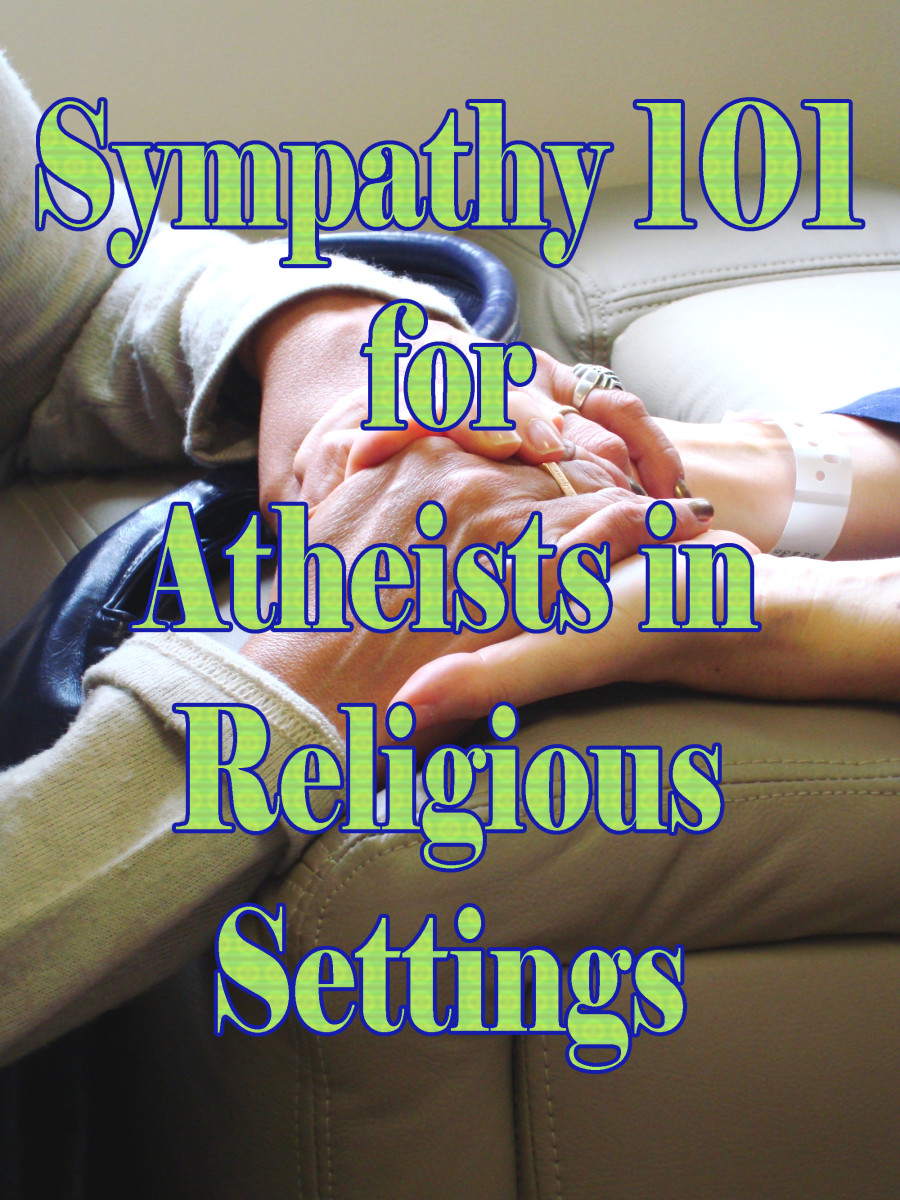Prepare Wills and Power of Attorney Documents Using Internet Based Software
Disclaimer: The author is not an attorney and does not have any connection with the Internet software company used as an example herein. This information is strictly from the experiences and observation of the author. The software is for personal use only. An attorney is the only professional authorized to create legal documents for another person.

Death has a way of creeping up on us. Before we know it, someone we love will be leaving our world, and we will be looking at each other and saying, "This could have been me. What if it had?" When this happens, we stop and think how fragile life is.
At these moments, we need to take advantage of our own vulnerability, and put into place the documents needed for our own estate. These include:
1. Wills
2. Durable Power of Attorney for Health Care and Finances
3. Advanced Health Care Directive or Living Will
These documents provide our loved ones with protection against the time when we are unable to manage our own affairs. They must be created for each individual and are considered to be legally binding, as long as certain criteria are met. These criteria are different depending upon the state in which we reside.
On-line software, such as Legacy Writer, creates the documents for us as we key in our individual information and answer some simple questions. The software is designed to take into consideration the various laws of the individual states in the United States. Instructions are printed out with the documents, giving the individual any necessary information.
Once created, the documents can be saved to the hard drive of the computer and changed as needed. The purposes of each document are indicated in the table below, then discussed in the paragraphs that follow.
Document
| Purpose
|
|---|---|
Will
| Outlines what happens to minor children, property, and material possessions after death.
|
Financial Durable Power of Attorney (FDPOA)
| Gives authority to a specific individual or entity to take care of financial affairs and the conditions under which this authority is valid
|
Health Care Durable Power of Attorney (HCDPOA)
| Gives authority to a specific person or entity to make health care decisions and the conditions when this authority can be used
|
Advanced Health Care Directive (AHCD)
| Outlines the beliefs of the individual and their desires for choices during end of life care
|

Duties of the Executor or Personal Representative
According to Legacy Writer, the executor of the will (or personal representative of the deceased) is responsible for:
- collecting the necessary documents for settling the estate, including death certificates, bills that need to be paid, financial asset records, and any other documents that need final action
- inventorying assets such as property, possessions, accounts, and holdings, initiating appraisals as necessary to determine current market value
- notifying beneficiaries of items left to them in the will, and managing these items until transfer is complete
- disposing of any assets not addressed directly in the will
- preparing final documents to wrap up the estate, including income taxes (state and federal), the payment of debt, and the closing of accounts
The Will
A will or "Last Will and Testament" is a document created for the purpose of distributing or disposing of one's estate following death. In most states, a signed, hand-written will is legally binding without witnesses providing no other document has been created previously by the person writing it. Computer generated or typewritten wills must be signed, witnessed, and notarized.
Wills contain different information depending upon the age of the person for whom the will is written. Individuals with young children give directives for the care of minor children and the passing of property to them when they come of responsible age. Trusts can be set up to hold financial or real property and caretakers appointed, if needed.
Individuals with adult children do not need to appoint guardians in their will, rather, they may have specific bequests, or gifts for their children or grandchildren. If there are family members with disabilities, the will can contain contingency plans for their care and how it will be financed. As each state has its own laws governing wills, it is wise to consult an attorney if the estate is extensive or complex.
Each will should contain the following items:
- Identification of family members
- Place of funeral and burial
- Specific gifts
- Desired distribution of the estate
- Appointment of an executor or personal representative to carry out the contingencies of the will, and handle the finances of the person following death
- Alternative methods of distribution if family members are not of age or have extenuating circumstances
If a person dies without a will, their heirs are subject to the laws of the state in which they reside. Courts determine the distribution of assets, as well as who is considered to be a legal heir, and the family must abide by their determinations. Court action can be contested should there be a valid reason for disagreement, however, the cost is high.
It is far better for the family to discuss the items in the estate, and have a will written that reflects what is best for all members. Ultimately, however; the responsibility for choosing what is in the document is with the person for whom it is written (the testator).
Will signing must be witnessed and notarized by people who are not affected by the contents and can vouch for the identity of the testator. A signing ceremony is a great way to formalize the process. Documents should be kept in a safe place, and updated when there are major changes in the estate, the beneficiaries of the will, or the need to name a different executor.

Durable Power of Attorney
A Durable Power of Attorney (DPOA) document gives authority to a specific person or entity to conduct business in behalf of someone who cannot do it for themselves. The authority of the POA is legally binding based upon the conditions contained in the document and ends upon the death of the individual. At that point, the person named as executor in the will assumes these responsibilities.
There are two types of POA documents that are part of estate planning: The Financial Durable Power of Attorney (FDPOA) and the Health Care Durable Power of Attorney (HCDPOA). Both are discussed below:
The Health Care Durable Power of Attorney (HCDPOA)
The HCDPOA is specifically designed to deal with decisions regarding the provision of health care. It is only valid when the person is incapacitated to the point that they cannot participate in the decision making process.
The various contingencies that can be granted include giving or withdrawing consent; employing or discharging physicians, nurses, therapists, and other health care workers; agreeing to fees and/or costs for care; arranging for care; refusing treatment; obtaining health care information and records; taking legal action to enforce compliance of wishes; protection of health care rights; provision of relief from pain; visitation rights; authorization of autopsy; the giving or organs; and advance funeral arrangements.
NOTE: the HDCPOA is not a living will, or Advanced Health Care Directive, and does not give information concerning the beliefs of the individual, or their desire to terminate life support should it be needed. It does; however, give the power to make decisions based on the information in the Advanced Health Care Directive.
The Financial Durable Power of Attorney (FDPOA)
The FDPOA is created for the purpose of giving someone other than ourselves the power and authority to take care of our financial affairs should we be unable to do so. We must choose this person carefully, and be able to trust that they will have our best interest and financial philosophy in mind when they execute their responsibilities. This person is named in the document, along with an alternate.
There are an infinite number of conditions under which a FDPOA would be needed, including, but not limited to: physical or mental illness, accidents, advanced age, disability, and/or disappearance. Legacy Writer creates the document by listing all of the circumstances that require financial decisions. These include transactions related to:
- real or personal property
- financial institutions
- business operations
- insurance policies
- trusts
- court claims or litigation
- maintenance of personal or family needs
- interaction with government entities
- retirement plans
- gifts.
Once the document has been created following the questionnaire, it can be downloaded to the computer as either a PDF or word document. Choosing the word document option enables editing and customizing for particular situations. We must be careful to give the representative only those powers that are reasonable and necessary, but at the same time, not hinder them from transacting necessary business in our behalf.
The Advanced Health Care Directive or Living Will
The Advanced Health Care Directive (AHCD), or Living Will, states a person's beliefs regarding the dignity of life and gives the family the permission to choose termination of life support given certain conditions.
As part of the questionnaire for the Internet-based software, the wishes of the person regarding the withdrawal of life-sustaining treatment, the giving of artificial hydration and nutrition, relief from pain, organ donation, euthanasia, and the refusal of medical treatment are given. This information is then outlined in the document.
This document becomes a companion document to the HCPOA, and gives the person acting in that capacity the information necessary to make informed decisions regarding the health care of the individual as they come to the end of their life.

Do you feel comfortable preparing your own documents, such as a will or power of attorney using Internet-based software?
The Signing Ceremony
Once the documents have been prepared, reviewed for accuracy, and discussed with all parties involved, they are ready for signing. Many states require these documents to be notarized, and individuals who can provide this service are found at many banks or places of business.
The Internet-based software creates the downloaded forms in such a way that all required signatures are indicated in the final document. If editing is done, these parts of the document need to be left as they are to ensure legal validity.
Schedule a signing ceremony with a notary public and the appropriate number of witnesses. The witnesses can be friends or acquaintances. They do not need to review the documents, or agree with their contents. They simply need to sign that they have witnessed the signing of the documents and can vouch for the identity of the signers.
It is wise to use a different color of pen than the printing of the document when signing, that way, originals can be easily identified. Original documents need to be kept in the possession of those for whom they were created. Copies can be sent to those who are executors, POAs, or close family members that need access to the information.
These documents should be reviewed on a regular basis, especially if there are major changes in the composition of the estate, the death of any party listed in the document, or the need to change those who have been designated as executor, personal representative, or POA.
Take the time to create the necessary estate documents for end of life planning today using Internet-based software.
This article is accurate and true to the best of the author’s knowledge. Content is for informational or entertainment purposes only and does not substitute for personal counsel or professional advice in business, financial, legal, or technical matters.
© 2014 Denise W Anderson







